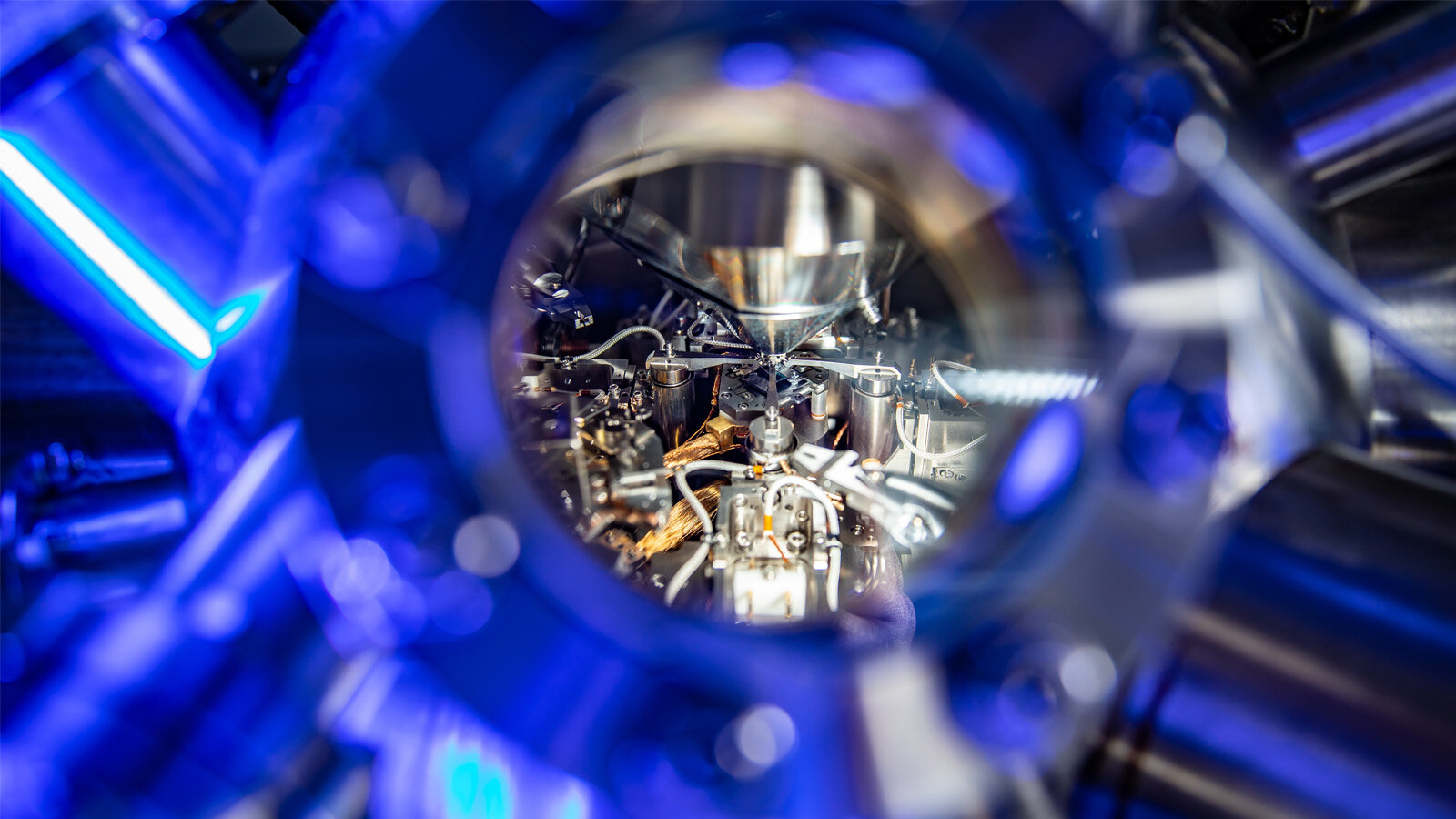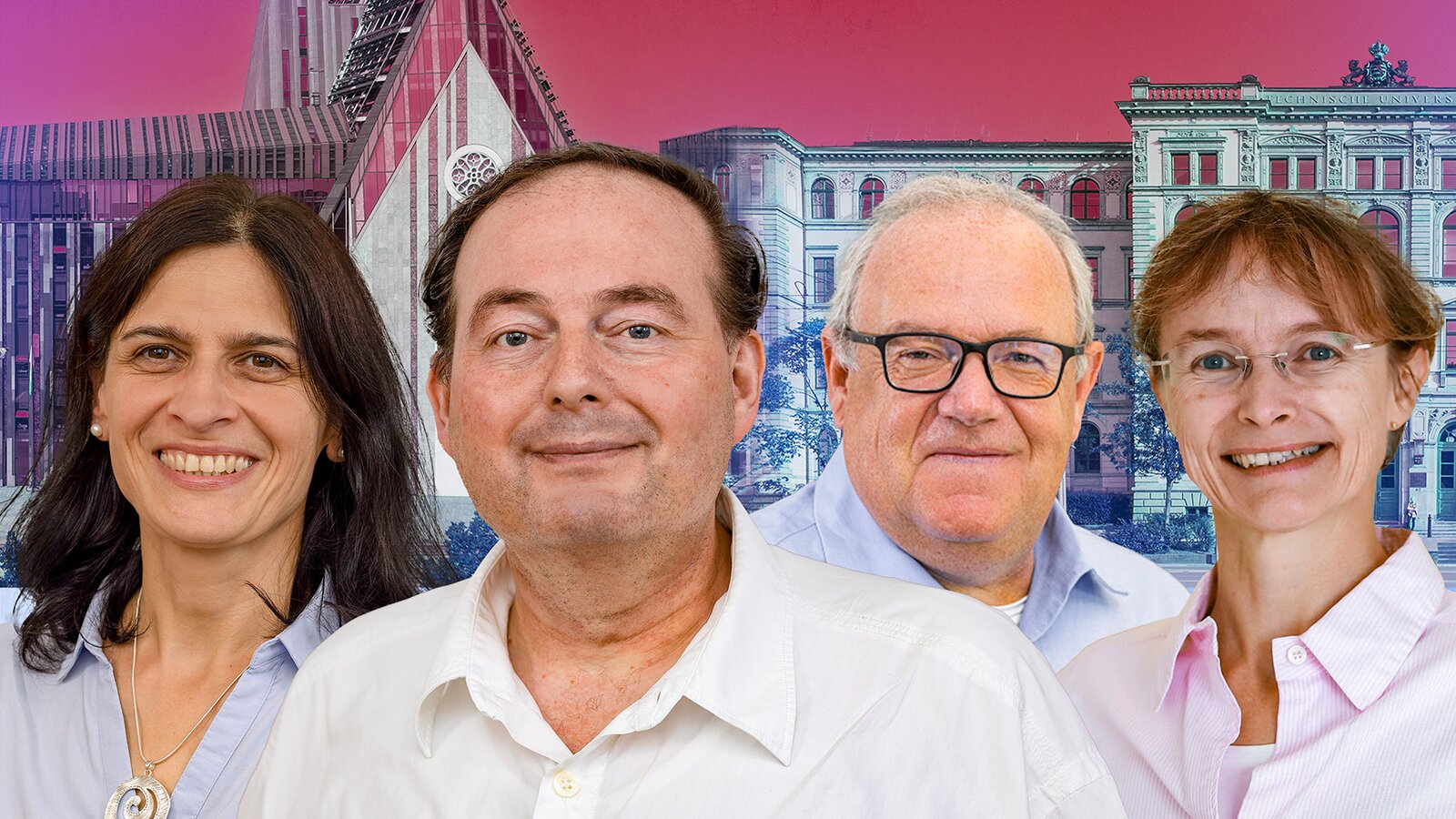Research team from chemistry and physics investigates hyperpolarization and strives for further improvement of molecular diagnostics
-
The management team of the Collaborative Research Center (from left): Prof. Dr. Georgeta Salvan (TUC/Photo: Jacob Müller), Deputy Spokesperson of the SFB/Transregio, Prof. Dr. Jörg Matysik (UL/Photo: Christian Hüller), spokesman for the SFB/Transregio, Prof. Dr. Berthold Kersting (UL/Photo: Christian Hüller), Deputy Speaker of the Research Training Group, Prof. Dr. Sibylle Gemming (TUC/Photo: Christian Hüller), spokeswoman for the research training group. Graphic: Jacob Mueller
-

dr Thi Ngoc Ha Nguyen, who will work as a postdoc in the Collaborative Research Center, in her research on so-called chiral molecules on surfaces. Photo: Jacob Mueller -

View of an ultra-high vacuum facility at the Institute for Physics at Chemnitz University of Technology, where investigations are carried out that contribute to the microscopic understanding of the electrical properties of molecules on surfaces. Photo: Jacob Mueller
Great joy at the University of Leipzig and the TU Chemnitz: The German Research Foundation (DFG) has approved an application from the two Saxon universities for a joint special research area/Transregio. The scientists involved will research “Hyperpolarization in Molecular Systems”. They want to lay the essential foundations for further advances in molecular diagnostics in medicine. The DFG is providing more than 13 million euros for the joint project in an initial funding period of almost four years. Funding begins October 1, 2023.
29 professors and young researchers from both universities and other external research partners will work together in the Collaborative Research Center (abbreviated “HYP*MOL’) deal with electron and nuclear spin hyperpolarization in molecular systems.
“The funding commitment is a reason for everyone involved to be happy and at the same time a great incentive,” says Prof. Dr. Eva Inés Obergfell, Rector of the University of Leipzig. “Hyperpolarization is considered an exciting, rapidly developing field of research. I think that our research team will contribute new, internationally visible findings.” The University of Leipzig is thus involved in 16 Collaborative Research Centers and has the role of speaker in five of them. “That’s something to be proud of and encourages us to initiate further applications.”
“I am very pleased about the approval of the Collaborative Research Center/Transregios HYP*MOL and would like to thank everyone involved, especially our Leipzig colleague Jörg Matysik and our colleague Georgeta Salvan, for their extremely successful commitment,” says Prof. Dr. Gerd Strohmeier, Rector of Chemnitz University of Technology. “The Collaborative Research Center/Transregio is a significant enrichment of our core competence materials and intelligent systems and stands for a fruitful and successful cooperation between the University of Leipzig and the TU Chemnitz.”
About the background of the research: Electrons and many atomic nuclei not only have an electric charge, but also a magnetic moment – the “spin”. So far, this has been worked on in three separate research areas of chemistry and physics, namely magnetic resonance, spintronics and spin chemistry. The focus is always on the controlled generation of a short-lived spin order of electrons or magnetic atomic nuclei, i.e. hyperpolarization, and its practical application, for example in medicine, electronics and catalysis.
“Hyperpolarization gives new impetus to existing applications of magnetic resonance, for example in medicine, and opens the door to exciting new possibilities,” says Prof. Dr. Jörg Matysik from the University of Leipzig, spokesman for the Collaborative Research Center (SFB). “For example, magnetic resonance imaging in hospitals could become faster and more precise. Purely organic electronic components on flexible carriers could be controlled with light and a magnetic field. New approaches in photocatalysis for hydrogen production could also come about.”
In order to be able to make significant contributions to the fundamental understanding of the generation of electron and nuclear spin hyperpolarization, their transport through molecular structures and their control, the fields of magnetic resonance, spintronics and the Spin chemistry merged and created a common knowledge base. “The 13 sub-projects of HYP*MOL provide a critical mass for the development of hyperpolarization-based methods for structure, imaging and sensing on the one hand and rationally designed molecular systems for hyperpolarization on the other. All projects are carried out by interdisciplinary teams that bring together experts in the fields of synthesis, analytics and theory,” adds co-spokeswoman Prof. Dr. Georgeta Salvan from Chemnitz University of Technology.
A graduate college will also be set up with the new SFB/Transregio. Young spin scientists should be trained to look beyond the horizon of a single research area and to use concepts from the three fields connected by the Transregio.
In addition to the University of Leipzig and the TU Chemnitz, the Rheinisch-Westfälische Hochschule Aachen, the University of Augsburg, the Leibniz Institute for Surface Modification Leipzig, the TU Munich, the University of Oldenburg and the University of Rostock are also involved in the Collaborative Research Center/Transregio “HYP*MOL”. . Researchers from the fields of medicine, biochemistry, chemistry, physics and computer science work closely together on the highly interdisciplinary project.
A notice: In line with the Collaborative Research Center, the international Hyperpolarization Conference take place. Professor Matysik is expecting around 150 researchers from 20 countries.
Homepage des SFB/Transregio „Hyperpolarization in molecular systems“: www.hypmol.net
Further information:
Prof. Dr. Jorg Matysik
Institute for Analytical Chemistry (University of Leipzig)
Phone +49 (0)341 9736112
E-Mail [email protected]
Prof. Dr. Georgeta Salvan
Professorship for Semiconductor Physics (TU Chemnitz)
Phone +49 (0)371 531-33137
E-Mail [email protected]
Mario Steinebach
19.05.2023
